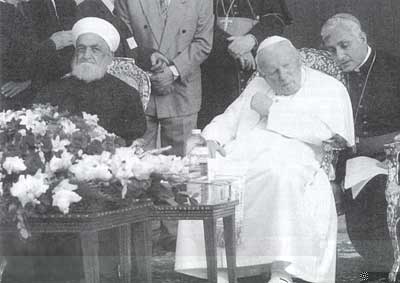The Pope & Islam
Dr. Heinz-Lothar Barth
|
Pope John Paul II arrives at the mosque. |
On May 6, 2001, on a Sunday afternoon, Pope John Paul II visited the great mosque of Damascus. According to Mohammedanism, it is a holy place; consequently, the Pope had to remove his shoes. In the courtyard, he stood and prayed before a statue of St. John the Baptist which reputedly contains the Baptist's head. Even if a church once stood in this place, nevertheless it is now a place of non-Christian worship for an unequivocally anti-Catholic religion.
God Wants to Be Prayed to in Truth
The extraordinary first visit of a Roman Pontiff to an Islamic house of prayer obliges us to express some thoughts on the relations between the Catholic hierarchy and Islam as they have occurred since Vatican II. This Council, which "in many respects can be described as a revolution,"1 generally recognizes that the Muslims adore the true God: "with us [they] pray to the one God" (Lumen Gentium, §16). It would be necessary to clarify that God wants to be prayed to in truth (Jn. 4:24) and that after the revelation of His Son, it is only by the Son that one can go to Him (Jn. 14:6; Acts 4:12). On this point the Koran is not indifferent or even open, but rather it is clearly opposed to the Trinity and to the Incarnation of the Second Person (Sura 4:171ff.; 5:116; and in many other places). The Christians are even threatened with hell (Sura 5:72) and their future is depicted in the bleakest terms (Sura 40, 69ff.). Even friendship with them is forbidden to Muslims (Sura 5:51). Thus it holds true for Islam—at least objectively so—that which Pope Paul VI quite exactly expressed in his apostolic exhortation Evangelii Nuntiandi (§53) of December 8, 1975: "Our religion establishes a real and vital bond with God, which the other religions do not succeed in doing, even if they stretch their arms towards heaven."
Is the Koran the Word of God?
It is equally dangerous to declare that the Muslims pray to "the one God who has spoken to men" (Nostra Aetate, §3). Immediately before this statement, all the other notes of the conciliar text concerning the god of Islam also apply to the true God. Should this be taken to mean, then, that according to the Christian faith, this declaration holds true for the god is Islam, too? Is the Koran, consequently, the word of God? This question is left open at every turn, as Hans Zirker has shown.2 In subsequent documents, it is granted that the Koran, as well as the "holy books" of other non-Christian religions, possess some degree of "divine inspiration"; they have some character of revelation.3 How is this imprecise notion to be understood?
The Koran certainly contains authentic elements derived from the Old Testament and the New; but these borrowings are integrated into a system of errors that contradicts divine revelation. Nowadays truth is taken to mean some positive element, such that religions are judged by the greater or lesser amount of "truth" that they contain. The Church, from the beginning, on the contrary, has always affirmed that the non-Christian religions were under the influence of the devil. The Second Vatican Council still repeated this teaching, albeit in a very reserved manner (Decree on the Missions "Ad Gentes" §§9, 14).
The Roman declaration of August 6, 2000, Dominus Jesus, emanating from the Congregation for the Doctrine of the Faith, only speaks—though speak it still does, which is remarkable in the post-conciliar context—of "superstitious practices or other errors" on which the rites of the non-Christian religions depend (§21), and describes the situation of non-Christians in comparison to members of the Church as being "objectively gravely deficient" (§22). But, on the other hand, departing from the Church's tradition, all the religions are held to have a salvific role, albeit limited, which, of course, would be derived from the redemption wrought by Christ.
"May Allah Strike Them Dead"
Another passage of Vatican II recognizes to the adherents of the Mohammedan religion that "they highly esteem an upright life" (Nostrae Aetate, §3). Certainly, Islam has some praiseworthy elements of sound ethics. (To give one concrete example: as soon as a German newsstand is run by a Turk, all the pornographic magazines disappear.4) But can one praise in general a religion that, for example, teaches that women are ontologically inferior to men (Sura 2:228; 4:34); that allows polygamy (Sura 4:3) and, in this domain, allows supplementary privileges to the religion's founder (Sura 33:50); that allows a man to strike his wife if she acts towards him in an "undisciplined" manner?
According to the Koran, in Paradise it is especially a man's appetites that will always be satisfied: the houris, comely virgins, are always at men's disposition yet never lose their virginity; an idea which constitutes a real perversion of the ideal of virginity (Sura 56:36). Lastly the standing threat of jihad needs to be remembered, the "great effort" taken in the sense of holy war, which potentially threatens the whole world, divided as it is between the house of Islam and the house of war, and which obliges Muslims to engage in it even against their will.
The Christians, even though they are a "people of the Book" and occupy a rung slightly higher than the polytheists, are ultimately ranked with the others because they teach the divinity of the Son and of the third Person—in the Koran, Mary—the Holy Ghost. "May Allah strike them dead," is their prayer expressed in the Koran (Sura 9:30). Thus, it is not surprising that Mohammed orders the believers to subjugate all the infidels, the Christians (and the Jews) as well as the polytheists (Sura 9:29, 33).
It has to be said that there are passages in the Koran contradicting the rules mentioned above; passages much more moderate in tone; it is to these that everyone refers in today's ecumenical dialogue. They go back, most often, to the debut of Mohammed, whose attitude became progressively hardened against Judaism and Christianity. Nevertheless, this observation does not negate the other Koranic directives cited. In fact, it shows the dilemma of a religion claiming to possess a revealed text that corresponds word for word to its heavenly origin, taken as uncreated. In reality, this text evolved over time and betrays on each page the preponderant influence of its founder's biography.
"Live Your Faith Abroad, Too"
Unfortunately, it is not enough just to critique certain affirmations of the Council concerning Islam; nor can one acquit Pope John Paul II of a certain ambiguity in his words and deeds, and his manner of conversing with the believers of Islam. This observation holds not only for the Pope's spectacular visit to the mosque at Damascus. In an allocution of August 19, 1985, at Casablanca, Morocco, the Successor of Peter was already assuring the young Muslims of his sympathy when he said: "The Catholic Church regards with respect your religious path, recognizes its worth and the riches of your spiritual tradition."5 At the Angelus of September 21, 1986, at Rome, while preparing for the prayer meeting of religions at Assisi, and going even further still, Pope John Paul II explained: "Every religion teaches that one must vanquish evil, seek justice, and accept others. This deep-seated fidelity, common to the respective religious traditions, is today more than yesterday, a requirement of peace."6 Faithful to this "logic," during his first visit to Germany, on November 17, 1980, the Pope had already exhorted the Muslims of Mayence: "Live your faith abroad, too!"7 What is left, then, of the commission of Jesus Christ to go forth and teach (Mt. 18:19ff)?
If, for reasons of prudence, it is not possible to fulfill this commission always and everywhere, one should never say anything to confirm the adherents of the other religions in their objectively erroneous faith while at the same time disorienting one's own flock. By holding the judgment that the Islamic faith is erroneous, according to the true divine Revelation, we do not wish, naturally to condemn the individual Muslim. He can, if he has never received the authentic good news of Jesus Christ, obey his ancestral religious practice, and often live in a more exemplary way than many Christians among us do in following the Gospel.

On May 6,2001, the Pope and the mufti of the Mosque of Omar.
A Significant Gesture
During his trip to the Sudan, a country in which the Christians are suffering a bloody persecution and are even reduced to slavery, the Pope declared: "Baraka Allah as-Sudan! May Allah bless the Sudan!"8 Could not the Muslims present interpret that remark, once again, as a recognition of their religion? One might object that "Allah" in Arabic is merely the word for "God." Indeed, but it was not without a precise intention that the Pope had interrupted an allocution spoken in English in order to interject this benediction in Arabic, the sacred language of the Koran.
Finally, while visiting the Catholic patriarchate of Baghdad, on May 4, 1999, a Muslim passing in the receiving line after the Catholic dignitaries, offered a copy of the Koran as a gift to Pope John Paul II, which, receiving it, he kissed [see photograph on p. 15]. So doing, he performed a very meaningful gesture, a gesture which is normally reserved to the book of the Gospels, the lectionary, or the missal at holy Mass.
This article first appeared in German in the Kirchliche Umschau, May 2001. It was translated by Angelus Press from the Society of Saint Pius X's French-language journal of Belgium, Pour qu 'Il règne.
1. His Eminence Christopher Cardinal Schonborn, Die Tagespost, March 10,2001.
2. Der Koran (Darmstadt, 1999), p. 18.
3. Komma, June 2001, p. 27.
4. Das Christentum und die Religionen, No. 92, 1996.
5. AAS 78/1986, 98.
6. Insegnamenti di Giovanni Paolo II, IX, February, 1986, 688.
7. Insegnamenti di Giovanni Paolo II, III, February, 1980, 1268.
8. L'Osservatore Romano, February 15, 1993.

